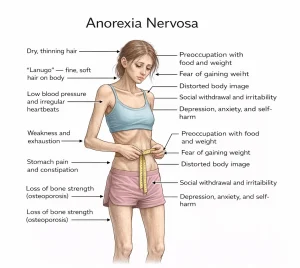Overview
Diagnosis of Anorexia Nervosa
Anorexia nervosa is diagnosed through a combination of physical exams, lab tests, and psychological evaluations. The goal is to rule out other medical causes of weight loss and detect complications caused by the disorder.
Physical exam
A complete physical evaluation is performed to check height, weight, body mass index (BMI), and vital signs such as heart rate, blood pressure, and temperature. The exam may also include checking skin and nails, listening to the heart and lungs, and assessing the abdomen for abnormalities.
Lab tests
Laboratory tests may include a complete blood count (CBC), tests to assess electrolytes, protein levels, liver function, kidney function, and thyroid activity. A urine test may also be done to identify dehydration or other issues.
Mental health evaluation
A mental health professional will assess thoughts, emotions, and eating habits. This evaluation may include structured questionnaires to help identify patterns associated with anorexia nervosa.
Additional tests
Imaging and other diagnostic tests, such as bone density scans, may be used to detect bone loss or fractures. An electrocardiogram (ECG) may be performed to check for heart rhythm problems caused by malnutrition.
Treatment of Anorexia Nervosa
Treating anorexia nervosa involves a comprehensive and multidisciplinary approach to restore a healthy weight, address psychological factors, and prevent complications.
Hospital stays and specialized programs
If a person’s health is at risk due to severe weight loss, dehydration, heart problems, or electrolyte imbalances, emergency hospital care may be required. Some patients may also benefit from specialized residential or day treatment programs for eating disorders, which offer structured care and nutritional rehabilitation.
Medical care
Close medical monitoring is essential throughout treatment. This may include tracking vital signs, hydration, and electrolytes. In severe cases, temporary feeding through a nasogastric tube may be needed to restore nutrition safely.
Restoring a healthy weight
The first treatment goal is achieving a healthy weight through a structured nutrition plan. A healthcare professional, psychologist, and registered dietitian typically work together to support weight restoration and the return of regular eating patterns. Family support plays a critical role, especially for children and teens.
Family-based treatment (FBT)
For adolescents, family-based therapy is an evidence-supported approach. Since the disorder affects decision-making about food and health, parents are guided to help their child restore weight and develop healthy eating behaviors until the teen can maintain them independently.
Medicines
Currently, no specific medication effectively treats anorexia nervosa itself. Nutritional rehabilitation is the cornerstone of treatment. In some cases, supplements like vitamin D may be recommended to address deficiencies caused by malnutrition.
Overcoming treatment challenges
Many people with anorexia may resist treatment because of fear of weight gain or a belief that they’re not ill enough. Ongoing therapy, consistent medical follow-up, and family involvement are crucial in preventing relapse, especially during stressful periods.
Key Takeaways
-
Early diagnosis and intervention improve recovery outcomes.
-
Nutritional rehabilitation is the foundation of treatment.
-
A multidisciplinary team provides medical, nutritional, and psychological support.
-
Family involvement is especially effective in treating teenagers.
-
Continued follow-up helps prevent relapse during stressful times.
Advertisement

